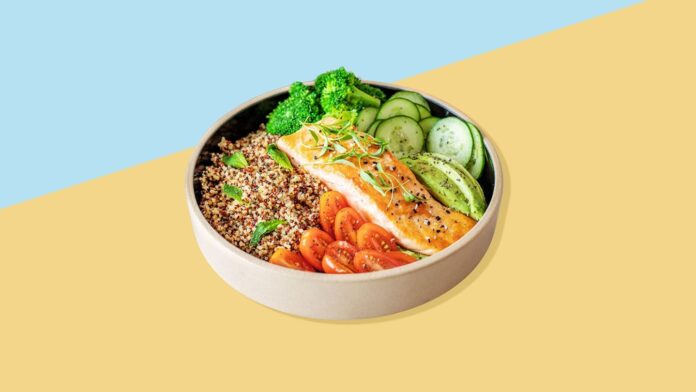What You Need to Know
Nutrition plays a crucial role in managing type 1 diabetes effectively. The food you eat has a direct and immediate effect on your blood sugar, significantly impacting your long-term health.
While there’s no one-size-fits-all diet plan for people with type 1 diabetes, various healthy eating approaches can work. These include low-carb, Mediterranean, vegan, vegetarian, and the Dietary Approaches to Stop Hypertension (DASH) diet. Individual factors like existing health conditions, preferences, culture, and religion also shape what works best for you.
The American Diabetes Association (ADA) recommends working with your healthcare team to create individualized diet plans that align with your personal goals. A thoughtful approach to nutrition can improve blood glucose, A1C, blood pressure, and cholesterol levels, help maintain a healthy weight, and potentially delay or prevent diabetes-related complications like retinopathy, neuropathy, and nephropathy.
The Fundamentals of Diabetes-Friendly Eating
It’s natural to feel pressure to adopt a strict diet to manage type 1 diabetes. Balancing blood sugar levels after meals is a central challenge, leading some to believe a rigid eating plan is the best approach.
While options like low-carbohydrate, ketogenic, Mediterranean, plant-based, and DASH diets are popular, experts caution against extreme versions of any eating plan.
Hayley Miller, MD, medical director at Mountain States Diabetes, recommends focusing on fundamental principles that can be applied to any eating pattern:
- Prioritize nonstarchy vegetables and lean proteins (chicken, turkey, fish)
- Choose high-quality carbohydrates (whole grains, legumes, fruit, low-fat dairy)
- Reduce added sugars and refined grains (white flour)
- Choose minimally processed whole foods and ingredients
- Limit saturated fat, added sodium, and sugar-sweetened beverages
- Prioritize dietary fiber and nutrient-dense whole foods
Using a continuous glucose monitor (CGM) can help understand how different foods impact blood sugar levels. Experts also highlight that processed foods are engineered for rapid consumption, unlike whole foods, which provide satiety signals.
Instead of trendy diets, experts like Miller and Aimée José, RN, CDCES, encourage flexible approaches, such as the Diabetes Plate Method, DASH diet, and Mediterranean diet, all emphasizing “more real food, less processed junk.”
Guidelines for Diabetes-Friendly Diets
These diets share common recommendations for:
- Fruits and vegetables: Aim for four to five servings daily
- High-quality carbohydrates: Whole grains, legumes, fruit
- Lean protein: Tofu, beans, nuts, fish, eggs, chicken, turkey, low-fat cottage cheese
- Healthy fats: Olive oil, avocado, almonds, walnuts, fatty fish, flaxseeds, chia seeds
Protein and Blood Sugar Control
While protein doesn’t directly raise blood sugar as dramatically as carbohydrates, consuming large amounts of animal protein can still impact levels. Experts recommend limiting protein from red and processed meats and focusing on healthier sources like tofu, beans, nuts, fish, and eggs.
It’s a misconception that protein doesn’t impact blood sugar. Large amounts of animal protein, or protein powder, can be converted into glucose by the body.
People with diabetic kidney disease need to work closely with their healthcare team to determine safe daily protein intake to prevent further kidney damage.
Embrace Healthy Fats
The ADA recommends getting 36-40% of your daily calories from fat, focusing on unsaturated fats:
- Monounsaturated: Olive oil, avocado, almonds, peanuts, cashews
- Polyunsaturated: Sunflower oil, soybean oil, corn oil
- Omega-3: Salmon, tuna, sardines, flaxseeds, chia seeds, walnuts
Limit saturated fats (fatty cuts of meat, butter, coconut oil) and trans fats (processed foods). Fat also influences blood sugar by slowing carbohydrate digestion, which can affect insulin sensitivity and dosage needs.
Vitamins, Minerals, and Supplements
While supplements are often marketed to people with diabetes, experts caution against their use. Prioritizing real, whole foods is recommended for obtaining necessary nutrients. Certain populations, like pregnant women, people with celiac disease, older adults, and those with plant-based diets, may benefit from supplements under healthcare provider supervision.
Tips for Eating Well With Type 1 Diabetes
Managing nutrition, insulin, and blood glucose can be overwhelming. These strategies can help:
- Consistency: Eating similar foods consistently makes insulin dosing more predictable.
- Meal Prep: Chopping vegetables and preparing meals in advance simplifies healthy eating.
Carbohydrate Quality Matters, Too
Rather than strictly counting carbohydrates, Miller suggests focusing on the quality of carbohydrates.
- Example: Two bags of chips and cookies (170g of refined carbs) are vastly different from a sweet potato and a 30-minute jog.
Consider the bigger picture: not every meal needs to have 60g of carbohydrates. Shifting focus towards high-quality, fiber-rich ingredients can offer effective diabetes management. Plant-based diets have shown potential benefits for overall diabetes health.
Desserts, pizza, or chips can be part of a diabetes-friendly lifestyle—ideally as a small percentage of your daily intake.
Protein and Blood Sugar Control
While protein doesn’t immediately raise blood sugar as dramatically as carbohydrates, consuming large amounts of animal protein can still impact levels. Experts recommend limiting protein from red and processed meats and focusing on healthier sources like tofu, beans, nuts, fish, and eggs.
It’s a misconception that protein doesn’t impact blood sugar. Large amounts of animal protein, or protein powder, can be converted into glucose by the body.
People with diabetic kidney disease need to work closely with their healthcare team to determine safe daily protein intake to prevent further kidney damage.
Embrace Healthy Fats
The ADA recommends getting 36-40% of your daily calories from fat, focusing on unsaturated fats:
- Monounsaturated: Olive oil, avocado, almonds, peanuts, cashews
- Polyunsaturated: Sunflower oil, soybean oil, corn oil
- Omega-3: Salmon, tuna, sardines, flaxseeds, chia seeds, walnuts
Limit saturated fats (fatty cuts of meat, butter, coconut oil) and trans fats (processed foods). Fat also influences blood sugar by slowing carbohydrate digestion, which can affect insulin sensitivity and dosage needs.
Vitamins, Minerals, and Supplements
While supplements are often marketed to people with diabetes, experts caution against their use. Prioritizing real, whole foods is recommended for obtaining necessary nutrients. Certain populations, like pregnant women, people with celiac disease, older adults, and those with plant-based diets, may benefit from supplements under healthcare provider supervision.
Tips for Eating Well With Type 1 Diabetes
Managing nutrition, insulin, and blood glucose can be overwhelming. These strategies can help:
- Consistency: Eating similar foods consistently makes insulin dosing more predictable.
- Meal Prep: Chopping vegetables and preparing meals in advance simplifies healthy eating.

















